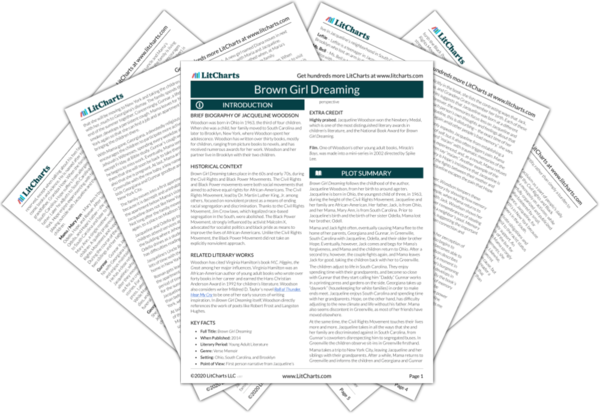Woodson examines what the North and the South mean to Jacqueline, and to African-Americans in the 60s more generally, as she follows Jacqueline’s moves back and forth between the two regions. Throughout Jacqueline’s childhood, she moves between the North (Ohio and New York City, to be specific) and the South (South Carolina). As she does so, both become home to her, but she develops different associations with each.
For Jacqueline, the South comes to connote a sense of belonging, comfort, and love. When she lives in Ohio and during her first few years living in New York City, Jacqueline seems to prefer South Carolina, where she is surrounded by extended family in a familiar setting. Jacqueline often uses positive words to describe the South Carolina landscape, and admires the smell of the South Carolina air and the rich red color of the dirt. Jacqueline is not the only character with this intense love for South Carolina. When she lives in Ohio, Mama longs for South Carolina as well, and talks about her homesickness with Grandma Grace, another South Carolina native.
The North, as Jacqueline describes it, lacks the sense of warmth and home that Jacqueline finds in the South. During Jacqueline’s first few years in Brooklyn, the city feels gray, cold, and lifeless to her. She misses the red dirt under her feet, which has been replaced by pavement and broken glass. Once Jacqueline adjusts to the neighborhood, and as her home in South Carolina changes (especially after Gunnar’s death), she begins to feel more at home in New York. Still, the South holds a special place in Jacqueline’s heart. In her author’s note, Woodson acknowledges that she still misses the South.
However, Jacqueline and her family have more possibility for upward social mobility in Brooklyn than in South Carolina, as they suffer less from overt racism and its corresponding economic effects. Mama moves to New York City from Greenville because of the multitude of jobs to be found there, and Jack, who is from Ohio, says that “no colored buckeye in his right mind would ever want to go [to the south]” because racism is so pervasive there. The racism of the South is outright dangerous for African-Americans; when the Woodson family travels on the bus from South Carolina, they only travel at night to avoid racial violence.
Jacqueline’s ambivalence about the North and the South—feeling that the North is alien but more hospitable for African-Americans, and the South is familiar and homey but racially regressive—causes Jacqueline angst as she is torn between the two spaces. Jacqueline is often frustrated by the fact that her accent, which changes from Northern to Southern and back again, marks her as an outsider in both places. Early in the memoir, Jacqueline says she is “born in Ohio but the stories of South Carolina already run like rivers through my veins.” This gives the reader a sense of Jacqueline as split between two homes. She uses “but” to connect the clauses, suggesting a tension between these factors of her identity. Jacqueline even asks herself at some point: “Will we always have to choose between home and home?”
By the end of the memoir, however, Jacqueline seems to have made peace with the fact that she has close ties to both the South and the North. Rather than seeing the South and North as two aspects of her identity that prevent her from uniform selfhood, Jacqueline begins to take up the idea that a multiplicity of home spaces could be a good thing. In the last poem of the memoir, Jacqueline states that “there are many worlds” and “you can choose the one you walk into each day.” Jacqueline seems to be implying that the different spaces that she can occupy and feel at home in provide her with a rich diversity of experience, a multiplicity that doesn’t need to cause internal tension. Jacqueline learns, essentially, that she doesn’t need to limit herself to one home.
The North and The South ThemeTracker

The North and The South Quotes in Brown Girl Dreaming
Part 1 Quotes
I am born on a Tuesday at University Hospital
Columbus, Ohio,
USA–
a country caught
between Black and White.
My birth certificate says: Female Negro
Mother: Mary Anne Irby, 22, Negro
Father: Jack Austin Woodson, 25, Negro
You can keep your South…
The way they treated us down there,
I got your mama out as quick as I could…
Told her there’s never gonna be a Woodson
that sits in the back of a bus.
We’re as good as anybody.
Part 2 Quotes
Don’t ever ma’am anyone!
The word too painful
a memory for my mother
of not-so-long-ago
southern subservient days…
The list of what not to say
goes on and on…
You are from the North, our mother says.
You know the right way to speak.
And I imagine her standing
in the middle of the road, her arms out
fingers pointing North and South:
I want to ask:
Will there always be a road?
Will there always be a bus?
Will we always have to choose
between home
and home?
Part 3 Quotes
Our feet are beginning to belong in two different worlds— Greenville
and New York. We don’t know how to come
home and leave
home
behind us.
Part 5 Quotes
And all the worlds you are—
Ohio and Greenville
Woodson and Irby
Gunnar’s child and Jack’s daughter
Jehovah’s Witness and nonbeliever
listener and writer
Jackie and Jacqueline
gather into one world
called You
where You decide
what each world
and each story
and each ending
will finally be.











